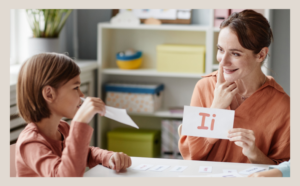No products in the cart.

By Amy Soukup, M.A., Director of Education
Regular communication between family and educators is important for the most effective collaboration in supporting a student’s academic growth. Here are 5 questions you might ask your child’s teacher or educator:
1. Can you share a highlight from my child’s learning?
Many special moments occur during a student’s learning, including moments where a concept “clicks,” insightful questions your child may have asked, or a funny story that highlights your child’s personality. It can be fun and meaningful to get a snapshot of your child’s learning experiences. This can also strengthen home-school connections and spark a topic of conversation with your child.
2. How can we support academic growth at home?
While much of academic content may be most effective when delivered by a trained and skilled educator, your child’s teacher will likely have ideas on how to support and extend your child’s academic growth at home through overall tips and tricks, routines, games, or activities. You can also share what you and your family are already doing in order to create an open dialogue and invite additional feedback.
3. What members of my child’s educational team might it be helpful to get connected with?
It may be helpful for your child’s teacher to connect with any outside members of your child’s educational team such as outside specialists, educational therapists, or tutors. If your child has an in-school learning specialist, case manager, or other support professional, it may also be helpful to get outside providers connected to this person. Likewise, feel free to share relevant documentation or notes between professionals as they come up. Educators will know how to identify relevant information and ask follow up questions as needed.
4. Are there any areas of potential concern?
As your child’s teacher tracks progress and gets to know students, areas of concern, observations, or questions may begin to rise. While most teachers communicate any major areas of concern, it can be helpful to check in directly to see if there are any potential flags for concern or need for additional support or evaluation. This can allow for preventative measures before a concern becomes potentially more significant.
5. When would be a good time to discuss or share my child’s progress in depth?
Brief check-ins with your child’s teacher are helpful to stay up to date and aligned on the path of educational support, but there is only so much information that can be conveyed in brief communication, especially for busy educators. Most schools have conference meeting schedules to allow for longer conversations to discuss progress, however, you may also want to check in to see if an additional meeting would be beneficial.
At Strategies for Learning, we create an ongoing support team by working with the family, school, and other members of a child’s educational team. Our collaborative approach and periodic progress updates ensure a full understanding of the work your child is engaging in and appropriate next steps as well as having the opportunity to ask questions or raise any concerns.
Learn more about our educational services.







No comment yet, add your voice below!